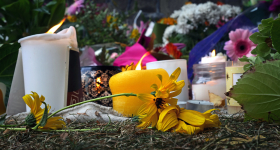by Sandip Roy
originally posted at New America Media
After two decades in the United States, I still feel a thrill of recognition when I see a South Asian name in the media. A winner on a cooking show on the Food Network, a congressional candidate in Kansas, a new appointee to some team on the White House - it does not matter, there is always that twinge of pride.
I look out for these names.
That was why I noticed Dharun Ravi’s name. And felt a chill go through me. Tyler Clementi, 18, had jumped off the George Washington Bridge after his roommate and a friend secretly taped him on their webcam having a sexual encounter with another man. And then they streamed it on the Internet.
The roommate’s name was Dharun Ravi. The headline on one article said “Dharun Ravi: The Reason for Tyler Clementi’s Suicide.”
It has a picture of Ravi and the other person involved, Molly Wei. They look like high school yearbook photos. Ravi has curly hair, and a broad smile. He is wearing a black tie and black jacket. He looks like my cousins in New Jersey, the ones that go to Bhangra parties and have stellar GPAs.
It’s easy to call this a horrifying example of homophobia. Ellen Degeneres recorded a moving message about how even in 2010, teenagers are killing themselves because they get bullied for appearing gay.
Yet, I am not sure that is the story. I know nothing about Ravi. I just kept thinking as a newly arrived Indian college student in America, I would have not dared to come out to folks like Ravi’s parents. I would think they would not understand.
But, I would have had no qualms coming out to someone like Dharun Ravi.
My activist friend Urvashi Vaid who went on to head the National Gay and Lesbian Task Force often said not to worry about the conservatism of the uncle-auntie generation of the Indian immigrant community. It’s all changing with the next generation, she’d say. Her nephew was cool with all this. As is my niece. They have grown up knowing gay people. It’s not a big deal.
Could it be too much “not a big deal?” I don’t think it’s as simple as saying Ravi was homophobic. This is not Matthew Shepard in Laramie, Wyoming, pistol-whipped and left to die, tied to a fence like a scarecrow by men he met at a bar. That was 1998.
This is 2010. Clementi was out to Ravi. He requested permission to use the room to entertain his date. He complained on a forum that his roommate was tweeting about him and had turned the webcam on. He thought about moving out but worried a new roommate could be worse. He said he was “pissed” and his roommate was “obnoxious.” He sounds annoyed, not suicidal, paranoid about finding all the webcams.
In a strange way this is about a nonchalance around sexuality where it has become a public sport. A few years ago, a teenager in India videotaped his female classmate performing oral sex on him on his cell phone and emailed it around. It got auctioned off on India's subsidiary of eBay and became a viral sensation. The young woman apparently had to leave the country. Did he intend to hound her out of the country? Probably not. Just as Ravi and Wei probably never intended for Clementi to jump off a bridge.
Maybe they thought they were just having fun. A sort of online game of showmanship and truth-or-dare with ever higher stakes. Privacy meant nothing. It was just a game and they needed to outfox Clementi to get to the next level. We want people to watch us online. We want them to follow us on Twitter. We don’t care that our online hijinks have real life consequences. It’s as if we get more points in our virtual worlds, if we catch our friends in flagrante delicto. We are perpetually on candid camera, playing gotcha with our webcams.
Coming out has always been a lonely process. You could grow up in a country with a billion people and not know how to find another gay person. I remember standing in a phone booth in Mumbai, trying to pluck up the courage to call a newsweekly because one of their editors had come out as gay in an article I had read. I never did make the call.
The Internet changed that. Now gay men and women, coming out in small towns, in remote corners can safely find other people to chat with, create virtual world wide webs of support while sitting in their own bedrooms. An Internet group in India, GayBombay eventually became a flesh-and-blood group that hosted parent support meets.
Yet, Clementi's death proves the Internet is a double-edged sword. Ravi and Wei are accused by the media of sexually harassing and bullying Clementi. That they could have done any time, in person, in private. They were not even trying to out him. They just wanted the world to see him online with his pants down. They wanted to tweet about it. They wanted to make his private encounter a "free show" for the world to see. They probably thought it was not a big deal. But it was. Horribly so. Done without his consent and streamed to the whole world to see.
It's just life in the online world where everything is fair game and privacy is just a Facebook option.
Chillingly, Clementi left behind his last message as an update on his Facebook page.
"Jumping off the gw bridge, sorry."









Comments